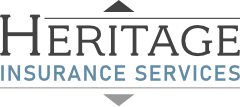
Dwelling Coverage
This protects the physical structure of your home. Exterior and interior walls, roof, ceiling, floors, and all attached structures such as garages and decks.

Additional Structure Protection
This protects any structure not physically attached to your home. This includes detached garages, sheds, or boat houses at the same location.

Personal Possessions Coverage
This protects possessions within your home such as clothes, furniture, televisions, and other personal belongings.

More About Auto Insurance
These are some factors (not all) that Heritage Insurance Agents will assess in determining which of our companies fits your risk management needs. We will then shop the price to ensure the best fit within those companies.
Factors for Homeowners Insurance Premiums
The following factors can affect your Homeowners Insurance Premiums:

Home Features and Characteristics
Your home's age, type of structure, wiring, roof, garage, etc. can affect your homeowners insurance premium. Older homes can often cost more to insure, and those costs can differ depending on whether your home is brick, frame, stone or has synthetic siding.

Location
Where your home is located can change your homeowners insurance premium. For instance, your home insurance rate can be affected if your home is in close proximity to a fire station, is exposed to extreme weather, such as hurricanes, tornadoes or earthquakes, or is in a neighborhood more prone to theft.

Protective Devices
Burglar alarm systems, smoke detectors, fire extinguishers, sprinkler systems and deadbolt locks can lower your homeowners insurance premium.

Personal Factors
What you do can also affect your homeowners insurance premium. For instance, smokers may pay more for home insurance than nonsmokers. Other factors to consider are credit and financial stability. Some things you may not think about include the type animals you own, the breed of the animals, and if you have any trampolines or pools on your property.

Claims History
If you have a history of claims on a homeowners insurance policy, you may pay a higher premium.
Levels of Coverage:
When you purchase property insurance for your home, you typically have a choice of three different levels of coverage: Basic, Broad and Special. These three options are available on the dwelling itself and your belongings.
Basic Coverage
The Basic Form policy is the least comprehensive of the three coverage options. It is usually offered by carriers when the property is not in good condition, is under remodel, vacant or is old and without wiring, plumbing or heating updates.
Broad Coverage
Broad Form policies offer more coverage than Basic Form. They include coverage for all of the same hazards in a Basic Form policy plus several additional hazards.
Special Coverage
Special Form coverage is the most comprehensive of the three options. All perils are covered except for what is specifically excluded in the policy. Read More….

You should carefully read and review the TYPE of policy form with your insurance agent. Carefully review the covered or excluded perils. In any property policy, make sure you understand which risks are covered and which are excluded.
Also, be sure to ask your agent about optional coverages that can be added to your policy for even better coverage.
Those options coverages include:
- Back up of sewer or drain
- Sump pump failure
- Scheduling your jewelry and guns
Deductible Options
For home policies, there are three common types of deductibles:
- A flat deductible is a specific or fixed dollar amount; for example, $2,500.
- A percent deductible is a percentage that it is based on the home’s dwelling coverage, often called Coverage A. For example, a 1 percent deductible on a home with $150,000 dwelling coverage is $1,500, and the same 1 percent deductible for a home with $300,000 dwelling coverage is $3,000. Keep in mind that as your home’s dwelling coverage increases the calculated amount of your deductible will also increase.
- A split deductible means there is a specific deductible that applies to some cause(s) of loss and a different deductible that applies to other causes of loss. For example, a percent deductible may apply to wind and hail losses, and a flat deductible may apply to all other causes of loss. A split deductible can be separate flat deductibles, separate percent deductibles, or a combination of both.
Have a Question?
Drop us a message! Our team is here to provide prompt responses and professional guidance.
